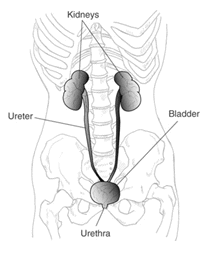Kidney and Urinal StoneHow are kidney stones treated? Fortunately, surgery is not usually necessary. Most kidney stones can pass through the urinary system with plenty of water—2 to 3 litres a day—to help move the stone along. Often, the patient can stay home during this process, drinking fluids and taking pain medication as needed. The doctor usually asks the patient to save the passed stone(s) for testing. It can be caught in a cup or tea strainer used only for this purpose. 
Lifestyle Changes A simple and most important lifestyle change to prevent stones is to drink more liquids—water is best. Someone who tends to form stones should try to drink enough liquids throughout the day to produce at least 2 quarts of urine in every 24-hour period. In the past, people who form calcium stones were told to avoid dairy products and other foods with high calcium content. Recent studies have shown that foods high in calcium, including dairy products, may help prevent calcium stones. Taking calcium in pill form, however, may increase the risk of developing stones. Patients may be told to avoid food with added vitamin D and certain types of antacids that have a calcium base. Someone who has highly acidic urine may need to eat less meat, fish, and poultry. These foods increase the amount of acid in the urine. To prevent cystine stones, a person should drink enough water each day to dilute the concentration of cystine that escapes into the urine, which may be difficult. More than a gallon of water may be needed every 24 hours, and a third of that must be drunk during the night. It is not enough to make general changes in your diet. You must get investigated for a specific defect in your system to enable proper and specific dietary advice. It is not enough to make general changes in your diet. You must get investigated for a specific defect in your system to enable proper and specific dietary advice. Medical Therapy A doctor may prescribe certain medications to help prevent calcium and uric acid stones. These medicines control the amount of acid or alkali in the urine, key factors in crystal formation. The medicine allopurinol may also be useful in some cases of hyperuricosuria. Doctors usually try to control hypercalciuria, and thus prevent calcium stones, by prescribing certain diuretics, such as hydrochlorothiazide. These medicines decrease the amount of calcium released by the kidneys into the urine by favoring calcium retention in bone. They work best when sodium intake is low. Rarely, patients with hypercalciuria are given the medicine sodium cellulose phosphate, which binds calcium in the intestines and prevents it from leaking into the urine. If cystine stones cannot be controlled by drinking more fluids, a doctor may prescribe medicines such as Thiola and Cuprimine, which help reduce the amount of cystine in the urine. For struvite stones that have been totally removed, the first line of prevention is to keep the urine free of bacteria that can cause infection. A patient's urine will be tested regularly to ensure no bacteria are present. If struvite stones cannot be removed, a doctor may prescribe a medicine called acetohydroxamic acid (AHA). AHA is used with long-term antibiotic medicines to prevent the infection that leads to stone growth. People with hyperparathyroidism sometimes develop calcium stones. Treatment in these cases is usually surgery to remove the parathyroid glands, which are located in the neck. In most cases, only one of the glands is enlarged. Removing the glands cures the patient's problem with hyperparathyroidism and kidney stones. Surgical Treatment Surgery may be needed to remove a kidney stone if it.
Until 20 years ago, open surgery was necessary to remove a stone. The surgery required a recovery time of 4 to 6 weeks. Today, treatment for these stones is greatly improved, and many options do not require major open surgery and can be performed in an outpatient setting. |

+91 - 95661 39630
+91 - 94441 68963



